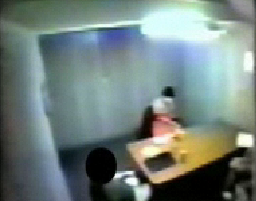 By Supporter Contributor Carli Leavitt
By Supporter Contributor Carli Leavitt

Omar Khadr is interrogated by two Canadians while a female CIA agent oversees. (Photo credit: Wikipedia)
In 2010, Stephen Brodie, who is deaf, was exonerated after serving 20 years in prison for child sex abuse. The 5-year-old victim explained that her attacker had a “strange voice” which eventually lead police to Brodie. He was interrogated for over 18 hours, oftentimes without a sign language interpreter present. As is the case with 1 out of 4 people who are wrongfully convicted, he eventually confessed to the attack even though he provided details that didn’t match the crime and also confessed to circumstances the police had fabricated.
As of November 2016, there have been 1,700 exonerations across the United States, totaling 15,288 years that innocent men and women have spent behind bars for crimes they didn’t commit. On average in the US, an innocent person will spend just under 9 years in prison before being exonerated. When the death penalty is on the table, the shocking prevalence of wrongful convictions becomes even more terrifying.

Awarded to Pete Shellem for his Investigative Journalism leading to exoneration of 4 innocent individuals. (Photo credit: Wikipedia)
Confessions are seen as the ultimate sign of guilt. So, how is it that people, 27% of all exonerated inmates to be exact, could possibly submit false confessions? While false confessions for horrific crimes such as rape, child sex abuse, or murder seem completely unfathomable, they happen more than one would think. The interrogation process can be grueling, confusing, and overwhelming, leaving even innocent people desperate to make it stop.
Another factor is the sheer trauma of the whole situation. If the victim was a loved one, this adds another level of emotional stress to the interrogation process. The suspect is reeling from the news of the crime then forced into a highly stressful situation of an interrogation. If you combine this intense abnormal situation with a communication barrier like hearing impairment, the results can be disastrous. Many people feel helpless, scared, and confused during the interrogation process, made even more apparent by a lack of food or sleep prompting even innocent people to admit guilt to crimes they didn’t commit.
We as a nation are starting to see the holes in the justice system as DNA exoneration is becoming more common, but for every case with significant DNA evidence, there are many more without. If wrongful convictions are as prevalent as it seems, imagine the true number of innocent Americans living behind bars, or worse yet, on death row.
I’m a young professional and graduate of UC Santa Barbara with a passion for social justice. I commonly write articles on the prison system, exoneration, and criminal defense. I’m based in Southern California and spend my free time riding my horse, surfing, hiking, and practicing yoga. To see more of my work, go to www.safer-america.com




